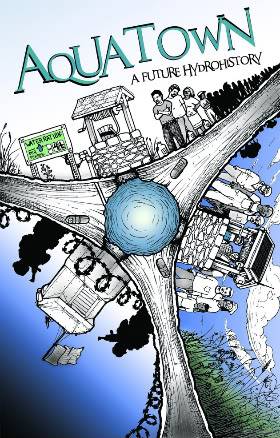 As if you didn’t have enough to worry about already, here’s one more thing: peak water. Start with the premise that aquifers aren’t constantly fully replenished, regardless of what the water cycle’s doing, in part because demand for water steadily exceeds an aquifer’s rate of replenishment. The aquifer gives more and more water until it reaches its peak, then gives less and less until nothing’s left. You could graph it as a Hubbert curve.
As if you didn’t have enough to worry about already, here’s one more thing: peak water. Start with the premise that aquifers aren’t constantly fully replenished, regardless of what the water cycle’s doing, in part because demand for water steadily exceeds an aquifer’s rate of replenishment. The aquifer gives more and more water until it reaches its peak, then gives less and less until nothing’s left. You could graph it as a Hubbert curve.
Even better: the remaining water’s harder to extract, so it costs more even as you suffer a water shortage. Sure, you might get thirsty, but you also might get to see the state governor literally pray publicly for rain instead of encouraging conservation.
Aquatown: A Future Hydrohistory — a “woven collage of music, theater, and dance” being performed June 10th through June 13th at the Urbana-Champaign Independent Media Center — begins with the premise that the Mahomet Aquifer (which gives C-U its water) hits its peak and declines somewhere around 2020. Meanwhile, climate change disrupts central Illinois’s rainfall cycles, producing alternate severe wet and dry monsoons. And the oil runs out, so you can’t fly around anymore and are stuck where you are — unless you work for UNESCO!
Lit-critic Raymond Williams once speculated that nature contains an enormous amount of unnoticed human history; Aquatown stages a future history of everyday life adapting itself to forces of nature.
Aquatown imagines how human adaptation to a changed climate might look from the years 2020 to 2070. Written and performed by the Change of State Performance Project and director Andrea del Moral, Aquatown features sparse set design and just three actors. These actors stage scenes of future daily life as it adapts to a world in which conservation gets enforced by scarcity. In the schoolroom, the dinner table, the park, the community center, the news bureau, Aquatown imagines how our modes of living might adapt for better or worse to a changed world. Scenes and roles shift rapidly, actors sometimes take on more than one role in the same scene, and the whole performance enacts the idea that out of scarcity and conservation, people can find a new sort of abundance.
Of course, Aquatown isn’t really about the future as much as it’s about the present. The performance asks its audience to notice how our habits in the present might be changed to conserve water (and other natural resources) and to live more sustainably in the world. If Hannah Arendt praised drama as the political art par excellence because it stages action, Aquatown is a political performance because it offers numerous new possibilities for living and asks its audience how we might live differently together. Drawing on traditions of radical theater in alter-globalization movements, Aquatown aims to contest the incessant drone of “There is No Alternative” to how we live with a faith that another world is possible. Aquatown stages the possibility.
When even The Economist features (as it did in its recent special report on water) an article arguing that human beings have to change how we use water because “to carry on with present practices would indeed be to invite disaster,” it is probably time to think about conservation — whether or not Hubbert’s curve or “peak water” are real.
Aquatown: A Future Hydrohistory will take place at the U-C IMC on June 10th, 11th, and 12th at 8 p.m. and on June 13th at 7 p.m. Tickets are $12 for adults and $6 for youth under 19. There’s a $2 discount for seniors and for those not arriving by car. Thursday’s show has free admission. And if you want to read a great book about water, check out William Vollman’s Imperial!








